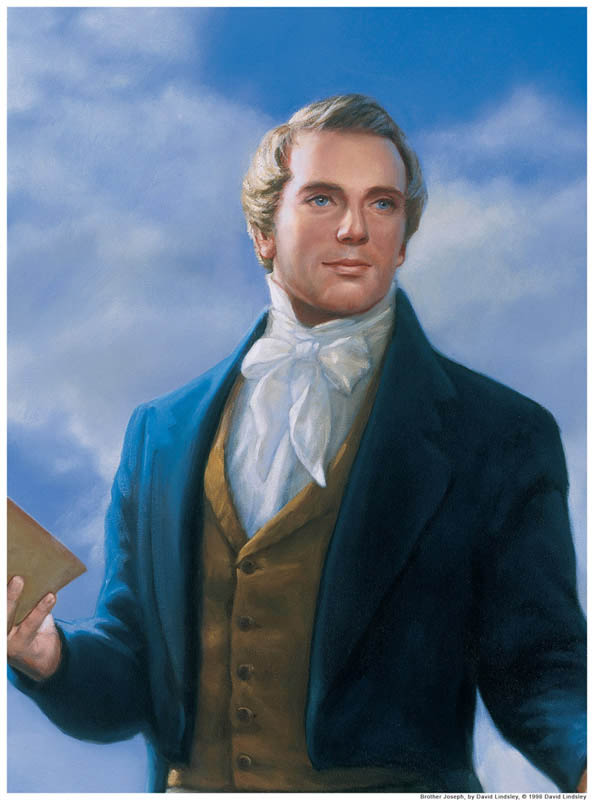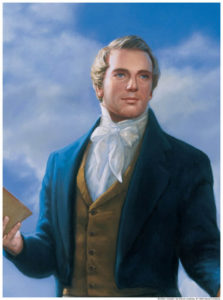C. S. Lewis, in a letter to T. S. Eliot, made this observation:
“Odd, the way the less the Bible is read the more it is translated! (The Collected Letters of C. S. Lewis 3:1346)
Members of The Church of Jesus Christ of Latter-day Saints (also known as the Mormon Church) cherish the Bible. They hold it sacred and revere its words. In fact, it was a Bible passage that started the Church.
 Joseph Smith, the founder of the Church, said his spiritual odyssey began this way:
Joseph Smith, the founder of the Church, said his spiritual odyssey began this way:
“I was one day reading the Epistle of James, first chapter and fifth verse, which reads: If any of you lack wisdom, let him ask of God, that giveth to all men liberally, and upbraideth not; and it shall be given him.”
“Never did any passage of scripture come with more power to the heart of man than this did at this time to mine. It seemed to enter with great force into every feeling of my heart. I reflected on it again and again.” (JS-History 1:11-12)
The Bible overpowered his mind. It was these words that drove him into a grove of trees and to pray to God. Such is the power of the Bible.
Members of the Church of Jesus Christ use the King James Version (KJV). This is the version I grew up using. The cadence of the language is sublime, capturing the essence of Shakespeare and the Renaissance. That era was one of the most crucial for civilization and humanity. Our world, it seems, is as prosperous as it is because of the Renaissance. The energy and zest of that age are crystallized in the words of the Bible.
However, some people are critical of the KJV. I heard a radio pastor once refer to the KJV as “an antique.” This was more of a tongue-in-cheek sarcasm than anything else. But his point is taken: the KJV is archaic, and to the untrained ear, it sounds like high-faluting pidgin.
C. S. Lewis loved the KJV, but he also saw the necessity for new translations. He asserted that we outgrow translations as we outgrow clothing (See The Quotable Lewis, 73-73). But the problem is not so much one of outgrowing translations as it is outgrowing doctrines.
Speaking in 1970, Howard W. Hunter, an apostle and later president of the Church, made this statement:
“What of spiritual values and the religious ideals of past generations, which have been the great stabilizing influence on society? Modern thinkers claim these have been the great deterrents to man in the freedoms he now seeks.”
“There is a great effort on the part of so-called modernists to change religious beliefs and teachings of the past to conform to modern thought and critical research. They deemphasize the teachings of the Bible by modern critical methods and deny that scripture is inspired.”
“The modernist teaches that Christ is not the Son of God. He denies the doctrine of the atoning sacrifice by which all men may be saved. He denies the fact of the resurrection of the Savior of the world and relegates him to the status of a teacher of ethics. Where, then, is hope? What has become of faith?”
“There are those who declare it is old-fashioned to believe in the Bible. Is it old-fashioned to believe in God, in Jesus Christ, the Son of the Living God? Is it old-fashioned to believe in his atoning sacrifice and the resurrection?”
“If it is, I declare myself to be old-fashioned and the Church is old-fashioned. In great simplicity the Master taught the principles of life eternal and lessons that bring happiness to those with the faith to believe. It doesn’t seem reasonable to assume the necessity of modernizing these teachings of the Master. His message concerned principles that are eternal. Following these principles, millions of persons have found rich religious experiences in their lives.” (”Where, Then, Is Hope?” Improvement Era, December 1970, 115-116)
As we learned in Orwell’s Nineteen Eighty-Four, behind each translation there is a specific philosophy. The philosophy of Newspeak was anti-God. That is why Ampleforth, the poet-translator, got into so much trouble: in translating Kipling’s poem into Newspeak, he left the word “God” intact. An affront to Big Brother.
Not that I am accusing the Biblical translators of setting up a “Room 101” or a police state, but what will happen to the faith of Christians if we dilute, denature, or delete the doctrine of the Christ’s divinity? As President Hunter pointed out, Modernist Philosophy, and now Post-Modernist Philosophy, is in vogue. Any translator who subscribes to these atheistic and anti-theistic philosophies will reflect that secular bias in their word selection.
Thomas Jefferson, for example, had his own version of the New Testament. It is called The Life and Morals of Jesus of Nazareth. Essentially it is a cut-and-paste—with emphasis on cut—of the New Testament. But what he cut from the New Testament was all the references to Jesus’ divinity and miracles.
As Jefferson explained in a letter:
“I should proceed to a view of the life, character, & doctrines of Jesus, who sensible of incorrectness of [the ancient Jew’s] ideas of the Deity, and of morality, endeavored to bring them to the principles of a pure deism, and juster notions of the attributes of God, to reform their moral doctrines to the standard of reason, justice & philanthropy, and to inculcate the belief of a future state. This view would purposely omit the question of his divinity, & even his inspiration.”
“To do him justice, it would be necessary to remark the disadvantages his doctrines have to encounter, not having been committed to writing by himself, but by the most unlettered of men, by memory, long after they had heard them from him; when much was forgotten, much misunderstood, & presented in very paradoxical shapes.”
“Yet such are the fragments remaining as to show a master workman, and that his system of morality was the most benevolent & sublime probably that has been ever taught, and consequently more perfect than those of any of the ancient philosophers. His character & doctrines have received still greater injury from those who pretend to be his special disciples, and who have disfigured and sophisticated his actions & precepts, from views of personal interest, so as to induce the unthinking part of mankind to throw off the whole system in disgust, and to pass sentence as an impostor on the most innocent, the most benevolent, the most eloquent and sublime character that ever has been exhibited to man. (Thomas Jefferson to Dr. Joseph Priestley, Washington, 9 April 1803.)
As he explains in the letter, he began with the assumption that Jesus was not divine, but just a Palestinian Plato. Christ’s message, therefore, was merely one of ethics and Deism, which, coincidentally, was what Jefferson himself happened to believe.
Jefferson’s circular reasoning is apparent: Deism first, the facts second. We are more than grateful for the Declaration of Independence, but in this matter, Thomas Jefferson was clearly off-base.
Joseph Smith taught:
“The fundamental principles of our religion are the testimony of the Apostles and Prophets, concerning Jesus Christ, that He died, was buried, and rose again the third day, and ascended into heaven; and all other things which pertain to our religion are only appendages to it.” (“Chapter 3: Jesus Christ, the Divine Redeemer of the World,” Teachings of Presidents of the Church: Joseph Smith, [2007], 45–56.)
The Atonement, which is the Miracle of Miracles, is the linchpin of Christianity. If this doctrine is deleted, or obscured by a soft-ball translation of the Bible, what happens? If Christ’s divinity is not obvious—painfully obvious—in the Bible, then what good is the Bible? And what become of our souls and salvation?
The King James Version keeps these core doctrines intact. The Encyclopedia of Mormonism explains:
“Twentieth-century Church leaders have given a variety of reasons for the continued use of the KJV: it was the common translation in use in the English-speaking world at the time of the Restoration; its language prevails in all the standard works; a large number of passages in the Book of Mormon, which parallel the Bible, were translated into the English style of the KJV; the Joseph Smith Translation of the Bible (JST) was based on the KJV, with 90 percent of the verses unchanged. All latter-day prophets have used the KJV, and using the KJV in all Church publications has made it possible to standardize annotations and indices.”
“The KJV is viewed by many as a masterpiece of English literature. It has been called “the noblest monument of English prose,” and it is certainly the most influential; its translators “showed great sensitivity,” and the result was “destined for extraordinary influence and acclaim” (Speiser, pp. lxxiii-iv). H. L. Mencken praised it as “probably the most beautiful piece of writing in all the literature of the world” (Paine, p. viii). … ”
“After studying many modern English translations … President J. Reuben Clark, Jr., a counselor in the First Presidency, said in 1956 [in his book Why The King James Version?] that the KJV was “the best version of any yet produced”. For example, he felt that the KJV translators clearly portrayed Jesus as the promised Messiah and as the Son of God, and accepted the gift of prophecy, the reality of miracles, and the uniqueness of the love of Christ; whereas modern translations have tended to promote naturalistic explanations for divine action, preferred the word “sign” instead of “miracle,” and used “love” in place of “charity,” and “appoint” instead of “ordain.” His views have been influential among most Latter-day Saints. Not all alternative translations, of course, suffer from the problems identified by President Clark.” (Encyclopedia of Mormonism 1:109-110)
Admittedly, this is a bit of a technical matter. I read President J. Reuben Clark’s April 1954 General Conference talk about the King James Version. There is a lot of intricate evidence which does not lend itself for use in an introductory blog such as this. But President Clark’s objections were about doctrinal matters. The new-fangled translations dropped doctrinal matters. The crucial doctrines of the miracles, divine Sonship, atonement, resurrection, etc., were diluted.
Latter-day Saints are Christians through and through. We believe that Christ rose form the dead, and atoned for our sins. That is why Latter-day Saints have a certain zeal about having a having a Bible that reflects these truths. We must always keep in the forefront our Savior, Jesus Christ.
About kendalbhunter
Twitter •


